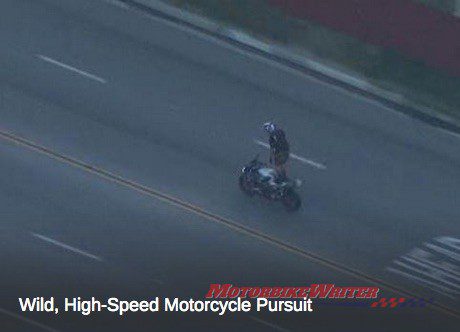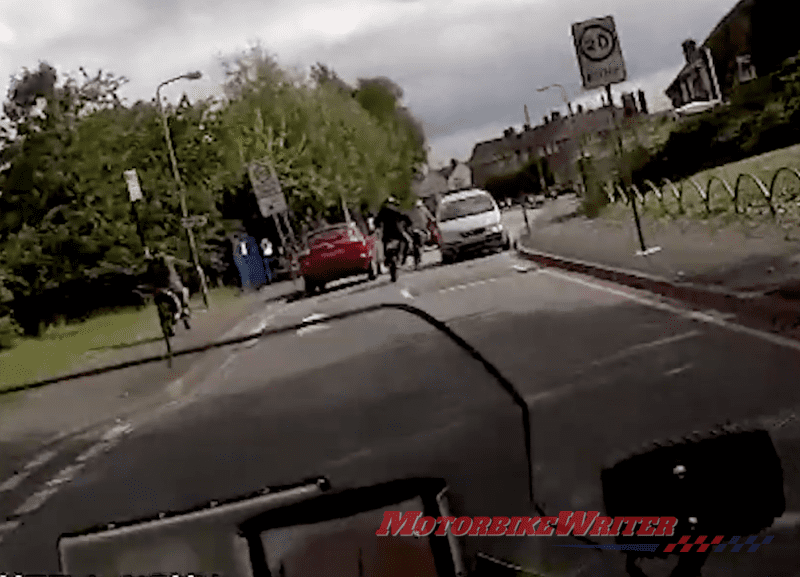Video of a dangerous UK police pursuit of three unregistered trail bikes through city streets has again put police pursuits under question.
The officer pursued the three riders who rode at almost triple the speed limit, on footpaths, through red lights and the wrong way down streets because the bikes were not registered and therefore not insured.
Seems like a flippant reason to endanger the life of the rider, other road users and pedestrians.
It follows three rider deaths in the past year in Australia after high-speed pursuits were started, but then called off.
- In February 2019, a 24-year-old Perth rider died after a woman who had been involved in a police pursuit crashed into him early Thursday morning on the wrong side of the road;
- Last December, a 35-year-old motorcycle rider who failed to stop for Queensland Police in Brisbane was later killed in a crash with a 4WD; and
- This month a male rider died in a crash with a pole after NSW police abandoned a pursuit in Newcastle for “safety reasons”.
In the UK pursuit, West Midlands Police caught only one of three riders, Owen Guest, 20, by using a stinger to deflate his Kawasaki’s tyres.
He was charged with dangerous driving and driving without a licence or insurance.
He was given 14 months in a young offenders institute, suspended for a year, and ordered to abide by a curfew and do 80 hours of unpaid community work. He was was also given a two-year driving ban and his bike was crushed.
The video does not show at what speed the riders were illegally riding their bike before the pursuit started, but it seems they went wild once they were pursued.
Dangerous pursuits
A leading police study has found the three most pressing issues for police reform around the world are use of force, policing of violence in families and high-speed pursuits.
A 2009 Australian Institute of Criminology study found deaths in custody at police stations are declining but “deaths in custody” as a result of high-speed pursuits were rising.
While less than 1% of police pursuits results in a fatal crash, 38% of the people killed are innocent bystanders.
It’s much worse in the USA where one person dies every day as a result of a police pursuit. Of those deaths, 1% are police, 55% suspects and 44% bystanders.
Most police procedures acknowledge the judgement of the officer at the scene to begin a pursuit.
However, continuation of a dangerous pursuit is then deferred to a senior officer at the station or headquarters.
They have to make a quick judgement based on how dangerous the pursuit is to the community versus the lethal risk to the community of letting a serious offender escape.
This must be backed by information, not just mere suspicion.
Queensland police figures show only about 3% of pursuits involved imminent threat to life or a suspect escaping after a homicide.
Police have a duty to not only prevent and control crime, but more importantly, they have a duty to protect the community and that includes from their own reckless behaviour and judgement.

Restrictive practices
Despite criticism from police unions, most pursuit policies around the world, including the USA, are becoming more restrictive.
In many jurisdictions, pursuits are only allowed if there is a serious risk to public safety or in relation to a major crime involving death or injury.
However, there is an issue about making these pursuit policies public. Some say they should be public to show transparency while others believe it would give criminals clues on how to evade police.
Those who support pursuits point out that the number of people evading police is rising as a result of more restrictive pursuit policies, despite higher penalties for evading police.
Making the issue more complex is the degree of the pursuit.
Should there be an upper speed limit for police? Should police be allowed to break other road rules in the pursuit?
There have been incidences of police driving at more than 200km/h in a pursuit and on the road side of a major highway.
Another issue is whether police should be criminally culpable in the instance of a death resulting from a pursuit.
To a degree, technologies such as CTV, helicopters and number plate recognition cameras, negate the need for pursuits, anyway.


